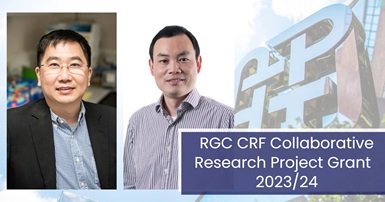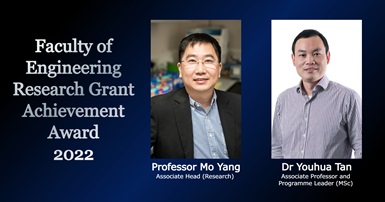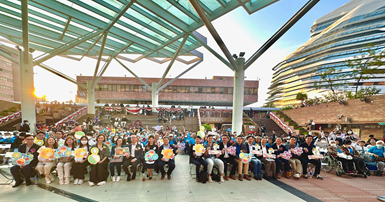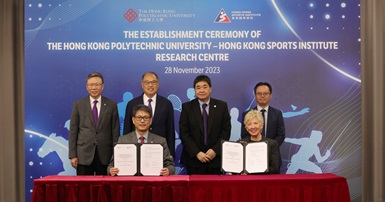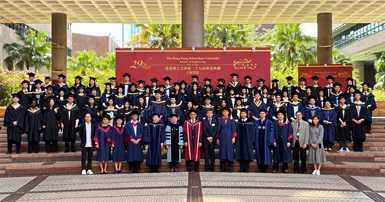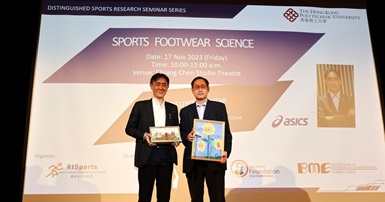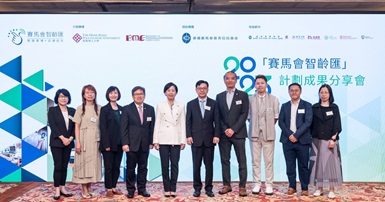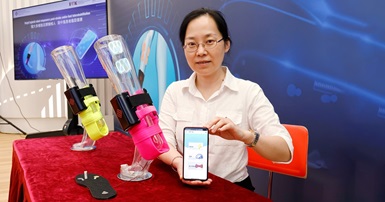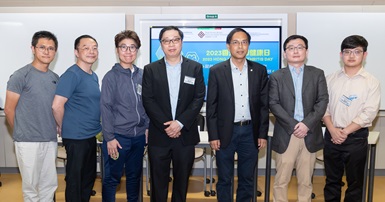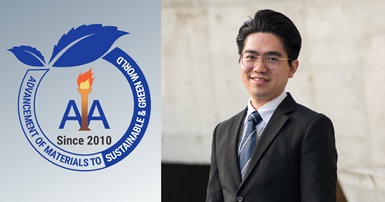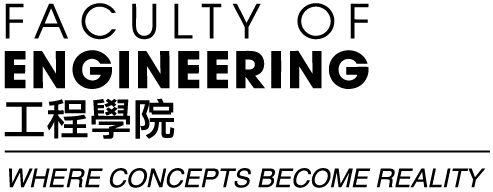Dr Xiaoling Hu and research team develop first-of-its-kind multimodal robot empowering post-stroke ankle-foot telerehabilitation
The Hong Kong Polytechnic University (PolyU) has achieved another breakthrough in rehabilitation device development. The Mobile Ankle-foot Exoneuromusculoskeleton is the first-of-its-kind multimodal robot for ankle-foot rehabilitation specifically designed for stroke patients with hemiplegia, which helps improve the motor function of their lower limb and walking ability. Powered by Internet of Things (IoT) technology, the device enables telerehabilitation for remote management of patients’ rehabilitation progress and allows them to undertake self-help rehabilitation exercises at home. Therapists can remotely monitor the rehabilitation progress of multiple patients.
In recent years, Hong Kong has seen around 50,000 new cases of stroke annually, with 85% of patients experiencing varying degrees of impaired physical mobility. Regular, repeated and intensive rehabilitation training is critical for restoring the physical mobility of stroke patients, thereby alleviating post-stroke symptoms such as disability. However, due to overwhelming demand, access to daytime outpatient rehabilitation services in local hospitals and rehabilitation clinics is challenging. Consequently, stroke patients are often unable to undergo timely and routine rehabilitation exercises.
Common functional impairments among stroke patients include foot drop and inversion, which significantly disrupt their daily lives. Developed by a research team led by Dr Hu Xiaoling, Associate Professor of the Department of Biomedical Engineering of PolyU, the Mobile Ankle-foot Exoneuromusculoskeleton is an innovative multimodal wearable robot for ankle-foot rehabilitation that integrates the advantages of exoskeleton, soft pneumatic muscles, tactile sensory feedback and neuromuscular electrical stimulation technology in one system. The device can not only correct foot drop and foot inversion effectively, but also improve the gait of stroke patients. Additionally, it can help improve balance while walking and contribute to rehabilitative neuroplasticity in the long term.
Stroke patients with hemiplegia generally have weakened muscle strength and discoordination at their affected lower limb, especially in the foot and ankle. The Mobile Ankle-foot Exoneuromusculoskeleton can automatically detect patients’ gait events including the standing state, heel strike, heel off and toe off. The multimodal assistance from the device can help a patient stand firm on their affected foot with mechanical support from the exoskeleton and soft pneumatic muscles, learn to balance the plantar pressure and exert propelling force when walking with the vibration tactile feedback and neuromuscular electrical stimulation, and improve foot drop with the neuromuscular electrical stimulation.
The Mobile Ankle-foot Exoneuromusculoskeleton features a lightweight design weighing about 400g which, together with its sportswear features, makes it more suitable for the hemiplegic patients to wear it unilaterally on their own. This device also has the advantage of low power consumption and can be used continuously for four hours with a 9V rechargeable battery, enabling patients to practice anytime, anywhere – at home, outdoors, or indoors. Other exoskeleton lower-limb robots available on the market, which rely solely on external force to assist patients in walking, they are of very limited value in improving ankle joint and muscle coordination for stroke patients with hemiplegia. These robots are also limited to use in hospitals and rehabilitation clinics due to their high weight and power consumption. As for conventional ankle-foot orthoses, these are prone to causing muscle atrophy and interference to patients regaining voluntary motor control over the ankle of the affected leg.
Dr Hu stated, “Combining the research capabilities of the Department of Biomedical Engineering, Industrial Centre, School of Fashion and Textiles and Department of Computing, the Mobile Ankle-foot Exoneuromusculoskeleton is a testament to PolyU’s exceptional strength in interdisciplinary research. This research achievement provides stroke patients a better option for lower limb rehabilitation training, incorporating the training into their daily activities. It also enables therapists to provide tele-supervision of the rehabilitation progress of multiple patients. We hope such flexible self-help training can effectively supplement traditional outpatient rehabilitation services, helping stroke patients achieve more efficient rehabilitation progress.”
Dr Hu’s research team is collaborating with several local and Mainland hospitals and rehabilitation clinics to conduct clinical studies on the Mobile Ankle-foot Exoneuromusculoskeleton. Research studies have confirmed that rehabilitation training for stroke patients using the device is 40% more effective for stroke rehabilitation than applying external mechanical forces alone. Among the 12 patients participating in the clinical studies who completed a 1.5-month training programme consisting of 20 one-and-a-half-hour sessions, ankle dorsiflexion improved from an initial five degrees to 10 degrees without equipment assistance, approaching the normal level of 15 degrees. In addition, more than 90% of the patients successfully corrected their foot inversion.
The research team also utilised IoT technology to record patients’ rehabilitation progress via a mobile app. This approach, incorporating functions such as real-time monitoring and progressive evaluation, as well as personalised guidance and reminders, enables patients to effectively engage in rehabilitation training even without the physical presence of a therapist, thereby improving patient engagement and treatment outcomes. The rehabilitation progresses of multiple patients can be matched to each other via the app for fostering mutual support and companionship throughout their training journey. It also enables therapists to provide remote monitoring and supervision on the progress of multiple patients, ensuring that rehabilitation proceeds smoothly.
Dr Hu’s research team plans to commercialise the Mobile Ankle-foot Exoneuromusculoskeleton next year. In 2021, she co-founded the startup Thecon Technology (HK) Limited, which has been supported by the Incu-Bio Programme of Hong Kong Science and Technology Parks. Last year, the startup successfully launched a mobile exoneuromusculoskeleton for upper limb rehabilitation, the “Mobilexo Arm”, onto the market. This product has been adopted by a number of local and Mainland hospitals and rehabilitation clinics.

